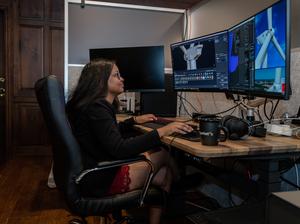
Being only two weeks into 2019, it’s hard to know what the rest of the year will hold for Wisconsin's tech startups.
But to try to get a sense of what to expect, Wisconsin Inno talked to venture capitalists and startup experts throughout the state to help gauge what might happen next based on how 2018 ended.
Their answers varied, but they mostly agreed that Wisconsin startup companies are poised to raise more venture capital than in years prior as the public and private sectors prioritize supporting local businesses.
They also believe healthcare and information technology companies will continue to dominate the state's tech industry, and that more people could be making the switch from corporate life to the startup grind.
Below are five Wisconsin tech predictions for 2019.
Wisconsin Corporations and VC Firms Will Invest More into Local Startups
Wisconsin startups raised more than $135 million in 2018, according to a MoneyTree report from PwC and research firm CB Insights, and local experts believe it will only go up from there.
Michael Thorson, the co-founder and managing director of Madison-based Inventure Capital and co-manager of Wisconsin Investment Partners (WIP), said he expects to see more investments being made into Wisconsin startups from the state’s VC firms.
“2018 was the largest investment year ever at Wisconsin Investment Partners,” Thorson said.
WIP, founded in 2000, mainly focuses on investing in biomedical, healthcare and IT startups in Wisconsin. Thorson said the firm invested nearly $4.5 million in 2018, a jump from previous years, when they’ve usually invested about $3.5 million.
Wisconsin has also seen new VC firms sprouting up lately, including 30 Ventures, founded by Madison investor George Arida, who was reportedly raising $15 million for the fund, and Rock River Capital Partners, a Madison-based early-stage venture capital firm that's raised more than $23 million.
“These are examples of improved access to capital,” said Fred Robertson, a Madison-based partner at Baird Capital, which is currently raising money for its fifth fund.
In addition to increased activity from Wisconsin VC firms, the state's corporations are also expected to make more commitments to supporting local tech in 2019. Companies like Northwestern Mutual and Aurora Health Care have both launched their own venture arms and been active startup investors.
Abby Taubner, the managing director of the gBETA program at Madison-based accelerator gener8tor, said the trend was one she and her colleagues had been advocating for over the last several years.
“From Northwestern Mutual’s standpoint, their industry is changing and they need to do more to stay competitive,” Taubner said.
The Badger Fund of Funds Will Help Grow Wisconsin Startups
The Badger Fund of Funds is a seed venture capital firm founded in 2014 with a $25 million investment from the state of Wisconsin. It is expected to be incredibly active in 2019 as it has already invested in local startups such as Fast Forward Forensics.
“What I do see is the ecosystem in Wisconsin getting a fairly robust boost from the start of the Badger Fund of Funds initiative,” Thorson said. “It will contribute a big jump in activity in Wisconsin.”
Matt Cordio, the founder of Skills Pipeline and Startup Milwaukee, said the fund should result in the growth of more early-stage startups in Wisconsin that have had difficult times raising seed rounds.
"The Badger Fund of Funds is a big missing piece of the ecosystem," Cordio said. "It's doing the work that angel investment groups should be doing."
Healthcare, Biotech and IT Startups Will Continue to Dominate Wisconsin
Historically, healthcare and information technology companies have dominated the Wisconsin tech market, partly because of the region’s history of strong healthcare systems, Robertson said. Both Madison and Milwaukee have tech successes in these industries. Madison's Propeller Health was acquired by ResMed for $225 million. And Shine Medical Technologies in Janesville received 2018’s largest financing deal when they announced a $150 million commitment from Deerfield Capital.
“Information technology is the segment that is also really strong in Madison, in part because of the proximity to Epic [Systems],” Robertson said. “There’s a lot of talented people looking to springboard off the skills they learned there.”
Most of Wisconsin's tech industry is made up of B2B companies, and Thorson said he expects that to continue in 2019.
“Do I ever think that Wisconsin is going to become a huge creator of social media startups? No, that’s not our area of expertise,” Thorson said.
More People Will Be Making the Jump from Corporations to Startups
As Wisconsin’s tech and startup industry continues to grow, Taubner said there might be an increase in the number of people switching from legacy corporations to smaller startups. She said the majority of the participants in gBETA’s last three cohorts in Milwaukee have come directly from corporations.
“That is something we’ve not seen in the previous years,” she said. “That’s really exciting for us because those entrepreneurs have industry and domain expertise.”
Cordio says oftentimes the best entrepreneurs are the ones who have left their corporate jobs.
"My hope is that more folks leverage the experience they've developed working at a large company and consider forming a startup to attack a problem they understand well," he said. "But what would be good to see is more programming developed for those kinds of entrepreneurs."
More Wisconsin Startups Will Raise Series A and B Rounds
For the last several years, finding VC capital in Wisconsin has been difficult for startups. Oftentimes, startups could secure initial seed funding, but when it came to finding later stage investments, they had to look elsewhere.
But going into 2019, Thorson said he thinks that trend will begin to change, mostly because of the VC and corporate firms that have made commitments to investing more.
“The trend that I see going forward in 2019 is companies being able to go out and more easily find capital for their next raises and not have to leave Wisconsin to do so,” Thorson said. "People over the years have bemoaned the fact that once you get a startup going and you’re looking for a larger, secondary raise of $2 to $5 million, there really aren’t a lot venture capital funds in Wisconsin. But I think that’s starting to change."
Though many predict Wisconsin VC firms will be investing more into the state’s tech industry, Taubner said it could still stimulate growth for startups to look elsewhere.
“As much as we want to cheer on Wisconsin and as much as we want Wisconsin’s tech ecosystem to thrive, I think a lot of what that requires is looking outside of Wisconsin for capital, customers, talent and best practices,” Taubner said. “Even if we lose one or two [startups] to other communities, I think the collective benefits from reaching outside of our borders are ultimately going to help us grow.”








